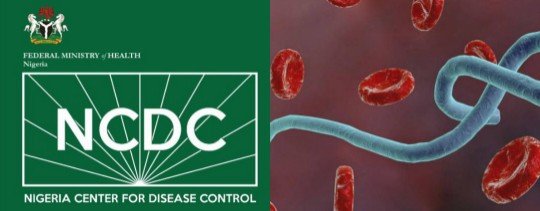The Nigeria Centre for Disease Control and Prevention (NCDC) has disclosed that there are no reported cases of Ebola Virus Disease (EVD) in the country, but issued health and travel advisory to Nigerians.
However, NCDC Director General, Dr. Jide Idris, stated that the centre will continue “to monitor disease occurrence and initiate measures to strengthen our preparedness in the country.”
The Centre made the disclosure in a Public Health Advisory, following the outbreak of the virus in the Democratic Republic of Congo (DRC).
The DRC Ministry of Health had confirmed the outbreak of Ebola Virus in the Kasai Province, where 28 suspected cases and 15 deaths, including four health workers, were reported, as of 4 September, 2025.
The outbreak reportedly affected the Bulape and Mweka health zones, where investigations revealed symptoms including fever, vomiting, diarrhoea, and haemorrhage (bleeding).
Samples tested at the National Institute of Biomedical Research in Kinshasa confirmed the Ebola Zaire virus as causative strain.
The mortality rate was also estimated at 57 per cent, though investigations and laboratory analyses were ongoing to refine the situation.
Dr Idris stated in the advisory that the NCDC will work in collaboration with relevant ministries, departments, agencies, and partners to prepare for, check and prevent the outbreak of the disease in Nigeria.
The NCDC Director General also disclosed that ongoing effort includes heightened surveillance, especially at the borders and points of entry.
“There are also on-going efforts to strengthen infection prevention and control measures in healthcare facilities across the country.
“Our risk communication and community engagement structures have also been alerted to ensure timely and accurate information is provided to Nigerians as well as track and address perceptions, rumours and misinformation,” he added.
The Ebola Virus Disease, formerly known as Ebola Haemorrhagic Fever, is a severe, often deadly disease caused by the Ebola virus, with a fatality rate of 25-90 per cent.
There are five distinct species of the dreadful disease which broke out in Nigeria in 2014 but was curtailed without much harm to Nigerians.
NCDC Public Health Advisory to Nigerians
To forestall and control the possible outbreak of the Ebola Virus in the country, the NCDC has urged Nigerians to adhere strictly to the following preventive measures:
• Practice good hand hygiene – Wash your hands regularly with soap under running water or use hand sanitizers when soap and water are not readily available.
• Avoid physical contact with anyone who has symptoms of an infection with an unknown diagnosis, similar to those earlier mentioned.
• Reduce the risk of wildlife to human transmission from contact with infected fruit bats or monkeys/apes and the consumption of raw meat.
• Animals should be handled with gloves and other appropriate protective clothing. Animal products should be thoroughly cooked before consumption.
• Avoid direct contact with the blood, saliva, vomit, urine, and other bodily fluids of suspected or confirmed EVD cases.
• If you or someone you know (with a travel history to any country with Ebola cases) experiences symptoms of EVD enumerated above, call 6232 or your state Ministry of Health hotline IMMEDIATELY for guidance.
NCDC Advisory To Healthcare Workers
The Centre has advised healthcare workers to maintain a high index of suspicion for EVD in their encounter with their patients.
“All health workers in all hospitals should practice standard precautions at all times.
“And when managing a suspected or confirmed case of EVD the following should be adhered to:
“Ensure strict isolation of the patient(s);
“Adhere strictly to infection prevention and control (IPC) measures, including the use of appropriate personal protective equipment (PPE) like face masks, hand gloves, appropriate gowns, safe sharps disposal etc.
“Report suspected cases immediately to the NCDC or State Ministry of Health for appropriate response and management.
NCDC Travel Advisory
The NCDC has advised Nigerian citizens and residents to avoid all but essential travel to countries with confirmed cases of Ebola Virus.
Persons already in Nigeria but with recent travel history to or transit through countries with Ebola cases in the last 21 days were also advised on measures to be taken.
Such persons who experience symptoms such as fever, muscle pain, sore throat, diarrhoea, weakness, vomiting, stomach pain, or unexplained bleeding or bruising, were advised to adhere to the following guidelines:
• Promptly call 6232 or state Ministry of Health hotlines for assessment and testing;
• Shelter-in-place to avoid further spread through shared transport systems (public or private) until health authorities reach out; and
• Await dedicated responders for assessment and possible transport to a designated treatment centre, if required.
“On our part, we will continue to strengthen surveillance across the country, including our borders and airports especially for travellers from affected areas.
“We will alert our health workers to heighten their level of suspicion for suspected cases; enhancing our laboratory capacities for quick testing of suspected cases.
“We will as well coordinate with the World Health Organisation (WHO) and the African Regional Health Authorities to monitor developments and share critical information.
“As you are aware, we continue to manage several other disease outbreaks, like Lassa fever, Meningitis, Diphtheria, Mpox, Measles and Anthrax, ravaging our communities.
“We will continue to provide periodic updates on these,” the NCDC Director General, Dr Jide Idris, added in the Public Health Advisory.






























